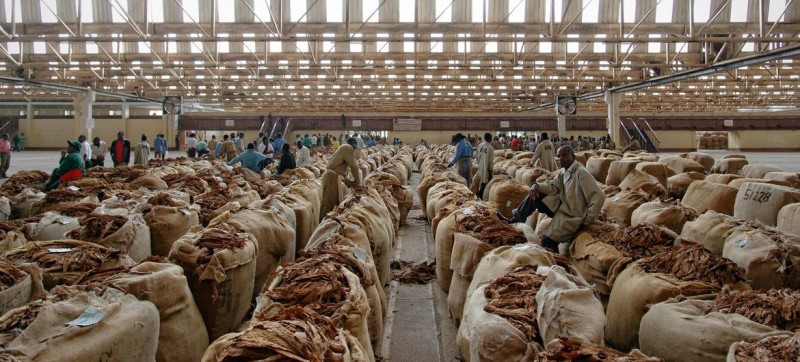© ILO/Marcel Crozet Processed tobacco is packed in a warehouse in Malawi. (file)
Ahead of World No Tobacco Day on Wednesday 31 May, WHO deplored that 3.2 million hectares of fertile land across 124 countries are being used to grow deadly tobacco – even in places where people are starving.
Tweet URL
WHO Director-General Tedros Adhanom Ghebreyesus said that governments across the world “spend millions supporting tobacco farms”, and that choosing to grow food instead of tobacco would allow the world to “prioritize health, preserve ecosystems, and strengthen food security for all”.
Disaster for food, environmental security
The agency’s new report, “Grow food, not tobacco”, recalls that a record 349 million people are facing acute food insecurity, many of them in some 30 countries on the African continent, where tobacco cultivation has increased by 15 per cent in the last decade.
According to WHO, nine of the 10 largest tobacco cultivators are low and middle-income countries. Tobacco farming compounds these countries’ food security challenges by taking up arable land. The environment and the communities which rely on it also suffer, as the crop’s expansion drives deforestation, contamination of water sources and soil degradation.
Vicious cycle of dependence
The report also exposes the tobacco industry for trapping farmers in a vicious cycle of dependence and exaggerating the economic benefits of tobacco as a cash crop.
Speaking to reporters in Geneva on Friday, Dr. Rüdiger Krech, WHO’s Director for Health Promotion, warned that tobacco’s economic importance is a “myth that we urgently need to dispel”.
He said that the crop contributes less than 1 per cent of gross domestic product (GDP) in most tobacco-growing countries, and that the profits go to the world’s major cigarette-makers, while farmers struggle under the burden of debt contracted with the tobacco companies.
‘Smokers, think twice’
Dr. Krech also explained that tobacco farmers find themselves exposed to nicotine poisoning and dangerous pesticides. The broader impact on communities and whole societies is devastating, as some 1.3 million child labourers are estimated to be working on tobacco farms instead of going to school, he said.
“The message to smokers is, think twice”, Dr. Krech said, as consuming tobacco came down to supporting an iniquitous situation in which farmers and their families were suffering.

© ILO/Marcel Crozet Workers at a tobacco factory in Malawi fill processing machinery with coal. (file)
Breaking the cycle
WHO, along with the UN’s Food and Agriculture Organization (FAO) and the World Food Programme (WFP) have joined forces around the Tobacco Free Farms initiative, to help thousands of farmers in countries like Kenya and Zambia to grow sustainable food crops instead of tobacco.
The programme provides farmers with microcredit lending to pay off their debts with tobacco companies, as well as knowledge and training to grow alternative crops, and a market for their harvest, thanks to WFP’s local procurement initiatives.
Soundcloud
Dr. Krech said that the programme was a “proof of concept” of the power of the UN system to enable farmers to break free from harmful tobacco cultivation. He outlined ambitious plans to expand the programme, as countries in Asia and South America were already requesting support.
“We can help every farmer in the world to get out of tobacco farming if they wish,” he said.




Comments are closed.